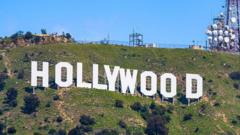In a bold move aimed at revitalizing the American film sector, President Donald Trump has announced plans to impose a significant 100% tariff on movies produced outside the United States. This decision has come amid ongoing trade disputes with various nations and is framed as a response to what Trump describes as a "concerted effort" by other countries to draw filmmakers away from the US.
Trump Proposes 100% Tariffs on Foreign Films to Revitalize US Cinema

Trump Proposes 100% Tariffs on Foreign Films to Revitalize US Cinema
US President Donald Trump threatens to impose 100% tariffs on non-American movies, citing a decline in the domestic film industry as a national security concern.
Trump made the announcement via his Truth Social platform, claiming the American film industry is facing a "very fast death" and labeling the current situation as a "National Security threat." He asserted that foreign films pose not only economic risks but also act as a form of propaganda against the US, emphasizing, "WE WANT MOVIES MADE IN AMERICA, AGAIN!"
Since his return to office in January, Trump has been aggressive in imposing tariffs across various sectors, contending that these measures will support American manufacturers and protect local jobs. However, critics warn that his tariffs have contributed to global economic instability and rising prices for goods worldwide.
As part of an initiative to bolster Hollywood, Trump previously appointed notable actors Jon Voight, Mel Gibson, and Sylvester Stallone as special ambassadors for promoting opportunities in the film industry. He urged their assistance in restoring Hollywood to its former glory, a vision clouded by the challenges faced by the industry, which saw a 26% decline in production spending last year, according to industry research firm ProdPro.
The US movie industry, while still a critical player globally, has seen notable competition from countries like Australia, New Zealand, Canada, and the UK, which have become more attractive filming locations. In response to the ongoing trade tensions, China has recently announced reduced quotas for American films, a move that further complicates the landscape for US filmmakers.
Trump's tariffs have been particularly harsh on China, with levies skyrocketing up to 245% on some goods. This escalation has drawn retaliatory measures from Beijing, which has imposed a 125% import duty on American products, worsening the trade friction between the two nations.
While Trump's administration stated it is exploring trade agreements, he noted he has no imminent plans to engage with Chinese President Xi Jinping despite ongoing discussions on trade. Trump indicated a potential willingness to reduce some tariffs on China in the future to facilitate business relations.
Follow the ongoing developments in US trade policy and entertainment with our comprehensive updates.
Since his return to office in January, Trump has been aggressive in imposing tariffs across various sectors, contending that these measures will support American manufacturers and protect local jobs. However, critics warn that his tariffs have contributed to global economic instability and rising prices for goods worldwide.
As part of an initiative to bolster Hollywood, Trump previously appointed notable actors Jon Voight, Mel Gibson, and Sylvester Stallone as special ambassadors for promoting opportunities in the film industry. He urged their assistance in restoring Hollywood to its former glory, a vision clouded by the challenges faced by the industry, which saw a 26% decline in production spending last year, according to industry research firm ProdPro.
The US movie industry, while still a critical player globally, has seen notable competition from countries like Australia, New Zealand, Canada, and the UK, which have become more attractive filming locations. In response to the ongoing trade tensions, China has recently announced reduced quotas for American films, a move that further complicates the landscape for US filmmakers.
Trump's tariffs have been particularly harsh on China, with levies skyrocketing up to 245% on some goods. This escalation has drawn retaliatory measures from Beijing, which has imposed a 125% import duty on American products, worsening the trade friction between the two nations.
While Trump's administration stated it is exploring trade agreements, he noted he has no imminent plans to engage with Chinese President Xi Jinping despite ongoing discussions on trade. Trump indicated a potential willingness to reduce some tariffs on China in the future to facilitate business relations.
Follow the ongoing developments in US trade policy and entertainment with our comprehensive updates.


















